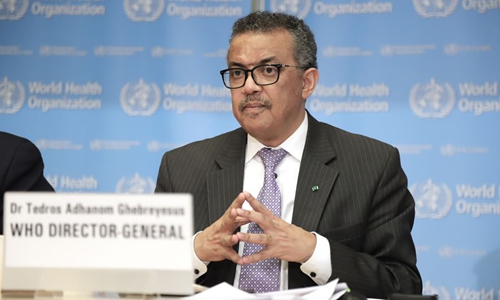
World Health Organization (WHO) Director-General Tedros Adhanom Ghebreyesus speaks at a daily briefing in Geneva, Switzerland. (Photo by Li Ye/Xinhua)
The World Health Organization (WHO) plans to send a team to China next week to prepare to identify the source of coronavirus, and Chinese experts believe the team should hold discussions with the Chinese side on how to conduct the work globally and fairly, noting that the visit does not mean the virus originated in China.
"We can fight the virus better when we know everything about the virus, including how it started," WHO Director-General Tedros Adhanom Ghebreyesus told a virtual press conference on Monday.
"We will be sending a team next week to China to prepare for that and we hope that will lead into understanding how the virus started and what we can do for the future to prepare," he said. He did not specify who will be in the team, nor what their specific mission will be.
Since the COVID-19 outbreak, China has maintained communication and cooperation with the WHO on the traceability of the virus, and Chinese scientists are also conducting exchanges with their international counterparts, Chinese Foreign Ministry spokesperson Zhao Lijian said at Tuesday's media briefing.
Zhao reiterated that the source of the virus should be studied and researched by scientists and medical experts, and China continues to support scientists of all countries in conducting global scientific research on the source and transmission of the virus.
Chinese experts believe that the upcoming visit demonstrates the Chinese government's open, transparent and cooperative attitude in tracing the source of the virus through joint international efforts and that the work should be done fairly and involve all relevant countries.
Zeng Guang, chief epidemiologist of the Chinese Center for Disease Control and Prevention, told the Global Times on Tuesday that although the exact arrangements for the WHO team are unknown, the team should communicate with Chinese experts on the preparation work to scientifically identify the source of the coronavirus and how the identification work should be conducted, and the team should also listen to Chinese experts' opinions on it.
It's not an easy job, and a great deal of preparation must be made, such as discussing the technical methods to research and identify the source, Zeng said.
"Identifying the source of the coronavirus must be based on negotiations and involve multiple countries," Zeng said.
The WHO should have a top-level design on identifying the source of coronavirus. First, all evidence on the source must be collected globally, and then be ordered according to when they happened, and then teams must be sent to all the involved countries for scientific identification and research, Zeng said.
"It does not matter which country the scientific identification work starts with, as long as it involves all related countries and is fairly conducted," Zeng said.
The WHO has held discussions with the Chinese side for a further mission in early May on the zoonotic source of the virus, Maria Van Kerkhove, head of WHO's emerging diseases and zoonosis unit, said at a press conference in May.
A source with the National Health Commission told the Global Times on Tuesday that the Chinese side and the WHO have been discussing the WHO's upcoming visit for quite a long time, but did not reveal any details.
Wang Guangfa, a respiratory expert at Peking University First Hospital who was a member of the WHO-China joint expert team in February, told the Global Times that international experts from the WHO and Chinese experts from the WHO-China joint mission objectively conducted field inspections with responsible attitudes to the epidemic's features and the Chinese government's policies in February.
The joint expert team visited Beijing, Wuhan, South China's Guangdong Province and Southwest China's Sichuan Province in February.
Wang believes that this time, the WHO team will continue to be responsible in exploring the transmission route of the virus in China.
China is only a link in the virus transmission chain, and the WHO has to go to more countries such as Spain, which reported coronavirus in its waste water sample collected in March 2019, for more comprehensive investigations on the virus origin, Wang said.
A resolution on identifying the zoonotic source of the coronavirus and evaluating the WHO's COVID-19 response was agreed by all the member states, including China, the US and Australia, at the 73rd World Health Assembly (WHA) meeting in May, rejecting political bias led by some Western politicians.
Some US and Australian politicians including US Secretary of State Mike Pompeo have, without any proof, repeatedly blamed China for causing the coronavirus pandemic and accused a Wuhan lab of leaking the virus. Experts from the WHO have repeatedly said that there is no evidence to show that the coronavirus was made in a lab.
Six months after the coronavirus outbreak, the world has seen 10 million coronavirus cases and 500,000 deaths.


